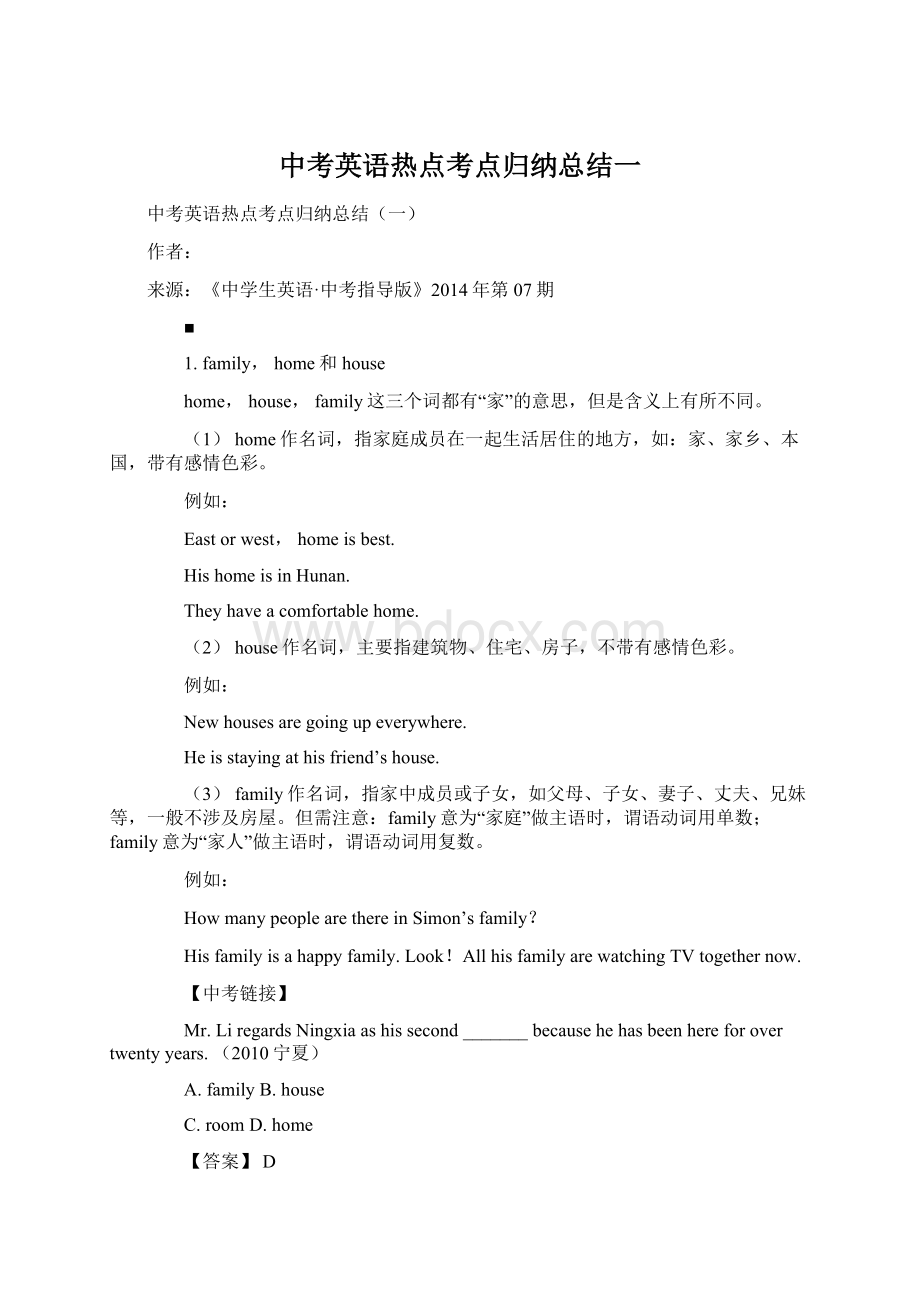 中考英语热点考点归纳总结一.docx
中考英语热点考点归纳总结一.docx
- 文档编号:5254496
- 上传时间:2022-12-14
- 格式:DOCX
- 页数:24
- 大小:30.29KB
中考英语热点考点归纳总结一.docx
《中考英语热点考点归纳总结一.docx》由会员分享,可在线阅读,更多相关《中考英语热点考点归纳总结一.docx(24页珍藏版)》请在冰豆网上搜索。

中考英语热点考点归纳总结一
中考英语热点考点归纳总结
(一)
作者:
来源:
《中学生英语·中考指导版》2014年第07期
■
1.family,home和house
home,house,family这三个词都有“家”的意思,但是含义上有所不同。
(1)home作名词,指家庭成员在一起生活居住的地方,如:
家、家乡、本国,带有感情色彩。
例如:
Eastorwest,homeisbest.
HishomeisinHunan.
Theyhaveacomfortablehome.
(2)house作名词,主要指建筑物、住宅、房子,不带有感情色彩。
例如:
Newhousesaregoingupeverywhere.
Heisstayingathisfriend’shouse.
(3)family作名词,指家中成员或子女,如父母、子女、妻子、丈夫、兄妹等,一般不涉及房屋。
但需注意:
family意为“家庭”做主语时,谓语动词用单数;family意为“家人”做主语时,谓语动词用复数。
例如:
HowmanypeoplearethereinSimon’sfamily?
Hisfamilyisahappyfamily.Look!
AllhisfamilyarewatchingTVtogethernow.
【中考链接】
Mr.LiregardsNingxiaashissecond_______becausehehasbeenhereforovertwentyyears.(2010宁夏)
A.familyB.house
C.roomD.home
【答案】D
【解析】home作名词,指家乡。
2.little,alittle与few,afew
区别一:
alittle和little修饰或指代不可数名词,与much相对;afew和few修饰或指代可数名词与many相对。
区别二:
alittle和afew含肯定语气,little和few含否定语气。
一般说来,在only,just,still,quite,not等词后用alittle或afew;在very,so,some,the,no等词后用little或few。
【中考链接】
We’dbetterwait_______moreminutes.IthinkJeffwillcomesoon.(2011河北)
A.afewB.few
C.alittleD.little
【答案】A
【解析】考查词语辨析,minutes是可数名词复数,排除C和D;由Jeffwillcomesoon可知:
前句用肯定形式。
“我们最好多等几分钟”,用afewmoreminutes表示。
3.join,takepartin和attend
这几个词或短语都有“参加”的意思,但用法不同。
(1)join有两个用法:
①指加入某个党派、团体组织等,成为其成员之一,意为“参军;入团;入党”等。
例如:
Whendidyourbrotherjointhearmy?
你哥哥什么时候参军的?
ShejoinedtheYoungPioneers.她加入了少先队。
②和某人一起做某事,其结构为:
joinsb.in(doing)sth.,根据上下文,in(doing)sth.也可以省去。
例如:
Willyoujoinusinthediscussion?
你参加我们的讨论吗?
He’lljoinusinsingingthesong.他将和我们一起唱歌。
We’regoingtotheEastLakeParkonSunday.Willyoujoinus?
我们打算星期天去东湖公园。
你跟我们一起去好吗?
(2)joinin多指参加小规模的活动,如“球赛、游戏”等,常用于日常口语。
例如:
Comealong,andjoinintheballgame.快,来参加球赛。
Whydidn’tyoujoininthetalklastnight?
昨晚你为什么没参加座谈?
(3)takepartin指参加会议或群众性活动等,着重说明句子主语参加该项活动并在活动中发挥作用。
例如:
We’lltakepartinsocialpracticeduringthesummervacation.暑假期间我们将参加社会实践。
Weoftentakepartinphysicallabour.我们经常参加体力劳动。
(4)attend是正式用语,及物动词,指参加会议、婚礼、葬礼、典礼等;去上课、上学、听报告等。
句子的主语只是去听、去看,自己不一定起主导作用。
例如:
He’llattendanimportantmeetingtomorrow.他明天要参加一个重要的会议。
Iattendedhislecture.我听了他的讲课。
【中考链接】
Anyonewhosingswellcan_______theactivityinourschool.(2011陕西)
A.takepartinB.takeoff
C.takeoutD.takecareof
【答案】A
【解析】本题考查动词词组词义的辨析。
takepartin“参加”;takeoff“起飞”;takeout“取出;拿出”;takecareof“照顾;照看”。
句意为“任何歌唱得好的人都可以参加我们学校的这个活动”。
故选A。
4.pay,spend,cost和take
(1)pay作动词时意为“付钱;支付”,主语为人,后面可以接用来表示“人”的名词或表示“钱”的数目;当表示“花钱买某物”时,常用sb.pay(somemoney)for(sth.)结构。
例如:
Howsooncanyoupayme(forthework)?
Ipaid200dollarsforthepainting.
Shetriedtoleavetheshopwithoutpayingforthedress.
(2)动词spend意为“用(钱);花费;度过(时间)”,其主语通常为人,常用于sb.spendtime/money(in)doing/onsth.结构中,意为“某人花费时间/金钱做某事”。
例如:
Hespendshalfanhour(in)doinghishomeworkeveryday.
Theyspendalotofmoneyinadvertising.
(3)cost作动词时也意为“花费”,但是它的主语只能是物,不能是人,其结构为:
sth.costs(sb.)money。
有时指“付出……代价”。
例如:
Thebookcostsmetenyuan.
—Howmuchdotheseshoescost?
—Theycost30dollars.
(4)take表示“花费”时是指花费时间或金钱,句型为:
Ittakessb.+时间/金钱+todosth.意为“某人干某事花了多少时间/钱”。
例如:
Ittookmetwohourstofinishmyhomework.
Ittookme300yuantobuythisMP3.
【中考链接】
—What’syourplanforthisweekend?
—I’mgoingto______itwithmy
grandparents.(2011连云港)
A.costB.spendC.giveD.pay
【答案】B
【解析】考查动词的辨析。
cost“值多少钱”,物作主语;spend“花费;度过”,人作主语;give“给某人某物”;pay“付款”,人作主语。
排除A。
句意:
我打算跟我爷爷奶奶度过周末。
故选B。
【中考链接】
I______someofmyfreetimeplayingbasketballformyschoolteam.(2011天津)
A.spendB.costC.takeD.pay
【答案】A
【解析】词义辨析。
这四个选项都有“花费”的意思,其中只有spend可用于spendtime(in)doingsth.题干中有playing,所以选择A。
5.surprised与surprising
两者都是形容词,surprised意为“感到惊讶的”,通常修饰人,常见句型有:
besurprisedatsb./sth.,besurprisedtodosth.,besurprisedthat...;surprising意为“令人惊讶的”,通常修饰物。
例如:
Weweresurprisedatthisnews.
I’msurprisedtoseeyouhere.
I’msurprisedthathedidn’tcome.
Shemadeasurprisingdecision.
It’ssurprisingthattheylostthematch.
类似以上区别的词汇还有:
interested与interesting;excited与exciting;disappointed与disappointing等。
【中考链接】
—WealllikeMissWang.
—Iagreewithyou.ShealwaysmakesherEnglishclasses______.(2011福州中考)
A.interestedB.interest
C.interesting
【答案】C
【解析】考查make+sb./sth.+adj.的用法。
句意:
——我们都喜欢王老师。
——我同意你的看法。
她总是使她的英语课堂有趣。
interested修饰人,而interesting则修饰物。
故选C。
6.wear,puton,dress和haveon
(1)wear意为“穿;戴”,表示穿的状态。
还可以用于“佩戴”装饰品等。
例如:
Shealwayswearssunglassesandareddress.
(2)puton意为“穿上;戴上”,强调的是穿的动作。
例如:
Putonthiscoat.It’scoldoutside.
(3)dress也表示“穿衣服”,用法与结构为:
dresssb.“给某人穿衣服”;dressoneself“穿衣”,这两种用法强调动作。
bedressedin+颜色,“穿……颜色的衣服”,强调状态;dressup“装扮;打扮”。
例如:
Thegirlwasdressedinwhiteatthemeeting.
(4)haveon“穿戴”,强调状态。
此短语不能用于进行时态。
例如:
HealwayshasonT-shirts.
【中考链接】
MostBritishhighschoolchildren______uniformsatschool.(2011山东济宁)
A.wearB.dress
C.putonD.dressup
【答案】A
【解析】词汇辨析。
wear“穿着”;puton“穿上”;dress“给……穿衣”;dressup“装扮;打扮”,由句意“大多数英国中学生在学校穿校服”可知,用wear。
故选A。
【中考链接】
Maryisusedto_______aT-shirtandjeans.(2011兰州)
A.wearB.puton
C.wearingD.puttingon
【答案】C
【解析】词义辨析。
句意“玛丽习惯于穿T恤衫和牛仔裤”,beusedtodoingsth.“习惯于做某事”,因此排除选项A、B,wear强调状态,puton强调动作,由句意可知此处表示状态,因此选C。
7.turn
turn意为“转动;变为”。
例如:
Turnleftatthesecondcrossingandyouwillseethepark.
Theweatheristurningcold.
与turn相关的短语有:
turnover翻转
turnoff关掉;关上
turnon打开
turndown调小(音量)
turnup调大(音量)
turnout证明是;结果是;生产
turntosb.向某人求助
taketurnstodosth.轮流做某事
It’sone’sturntodosth.轮到某人做某事
例如:
Let’staketurnstobeonduty.
Ifyouturnover,youmightfinditeasiertogettosleep.
It’smyturntocleantheroom.
【中考链接】
IcanhardlyhearwhatitissayingonTV.Wouldyouplease_______?
(2011安徽)
A.turnitupB.turnitdown
C.turnitonD.turnitoff
【答案】A
【解析】选A.turnup“调大”;turndown“调小”;turnon“打开”;turnoff“关闭”。
由前句“我几乎听不见电视在说什么”可知,应该是A项。
【中考链接】
Mike_______hiscomputerandcheckedhise-mail.(2010河北省卷)
A.turnedonB.turnedoff
C.turnedupD.turneddown
【答案】A
【解析】词汇辨析题。
看答案四个词组的词义,turnedon“打开”,turnedoff“关掉”,turnedup“调大音量”,turneddown“调小音量”。
句意为“Mike打开电脑,检查他的e-mail.”故选A。
8.other,another,theother,others和theothers
(1)other做形容词,意为“(泛指)其余的;别的”。
例如:
Doyouhaveanyotherquestions?
Pleasewriteiteveryotherline.
Ihaveotherbooksbesidesthese.
(2)theother则为特指,强调两者中的另一个/类,作形容词时,其后可接单数或复数名词。
作代词时单独使用。
常用于搭配one...theother.
例如:
Shehastwopens.Oneiswhite;theotherisyellow.
Hehastwochildren.Oneisadoctor,andtheotherisateacher.
(3)another表示泛指,意为“另一,另一些;再;又”。
作形容词时,后接单数或复数名词;作代词时,单独使用。
例如:
Idon’twantthisone,pleaseshowmeanother(one).
Theywouldlikeanotherthreechairstositon.
(4)others只能用作代词,意思相当于otherones,即“(泛指)某一部分人或物”。
例如:
Eachofusmustthinkofothers.
Someofuslikesinginganddancing;otherslikeplayingcomputergames.
(5)theothers只能用作代词,意为“(特指)余下的一部分人或物”。
例如:
Iknowonlyoneortwoofthestudents;theothersareunknowntome.
Ihavemanycups.Fourofthemarered,andtheothersareyellow.
【中考链接】
Mysisterhastwoskirts.Oneisyellow,and______isblack.(2009北京)
A.otherB.another
C.othersD.theother
【答案】D
【解析】根据关键词One可以联想到one...theother...的用法,故排除A、B、C三项,选D。
■
1.lookfor,find和findout的区别
(1)lookfor(v.+prep.)意为“寻找”,指寻找的动作,强调寻找的过程,未说明是否能找到,是延续性动词。
例如:
—Whatareyoulookingfor?
—Iamlookingformywatch.
(2)find意为“找到;发现”,指找到、发现的结果,是终止性动词。
例如:
Haveyoufoundthebookyouwerelookingfor?
(3)findout(v.+adv.)意为“打听出;查询出”,指经过打听询问后得知,后接表示“事实;真相;秘密”等意义的词或从句作宾语。
例如:
①—Whattimeistheplanetakingoff?
—Idon’tknowbutIcangoandfinditout.
②Pleasefindoutwhostolethecomputerlastnight.
【中考链接】
—Steven,couldyouhelpme______whentheplanewilltakeoffontheInternet?
—I’msorry.Mycomputerdoesn’twork.
(2010重庆)
A.getonB.findout
C.lookforD.lookafter
【答案】B
【解析】geton“上车”;findout“找出;发现”;lookfor“寻找”,表动作;lookafter“照顾”。
根据句意,答案应选B。
2.goout,gothrough,goover,goup,gooff
(1)goout出去,熄灭
例如:
D
- 配套讲稿:
如PPT文件的首页显示word图标,表示该PPT已包含配套word讲稿。双击word图标可打开word文档。
- 特殊限制:
部分文档作品中含有的国旗、国徽等图片,仅作为作品整体效果示例展示,禁止商用。设计者仅对作品中独创性部分享有著作权。
- 关 键 词:
- 中考 英语 热点 考点 归纳 总结
 冰豆网所有资源均是用户自行上传分享,仅供网友学习交流,未经上传用户书面授权,请勿作他用。
冰豆网所有资源均是用户自行上传分享,仅供网友学习交流,未经上传用户书面授权,请勿作他用。


 广东省普通高中学业水平考试数学科考试大纲Word文档下载推荐.docx
广东省普通高中学业水平考试数学科考试大纲Word文档下载推荐.docx
